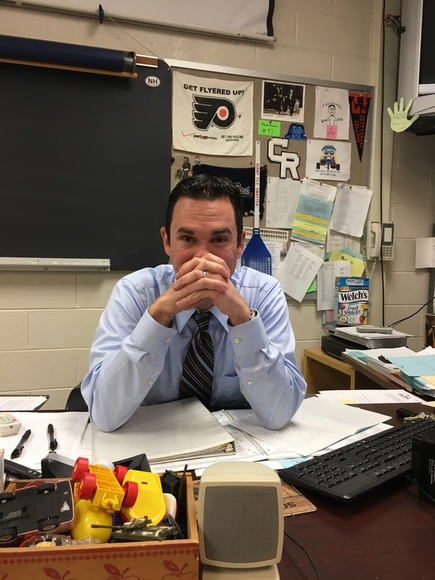 Photo by Sam Duckworth Photo by Sam Duckworth By Josee Li You’ve probably seen her walking around school events with a camera, dutifully taking pictures and interviewing students. With her bold red hair, Samantha Duckworth is a hard person to miss! As part of the yearbook club for two years now, Sam, a sophomore, expresses her love for creating “snapshots of great memories.” It all started a few years ago, when Sam discovered her great passion for photography. She would soon be able to take her love to the next level by joining the yearbook club in 2015. After becoming involved with the yearbook club, Sam realized that she liked the various aspects of being a yearbook developer. Sam enthusiastically stated, “I like talking to different people and seeing the various events that go on at our school.” In fact, she likes interacting with our school community and working in the yearbook club so much that she is now the head editor for the academic section of the yearbook. Some of her responsibilities include reaching out to various students to get quotes, pictures, and other information. Once she has collected her data and photos, she begins her long process of arranging and formatting the page in an aesthetically pleasing way. The end product is perfection, as the entire yearbook club works hard to produce what the whole school community views in June. I ask Sam a simple question at the end of the interview: “Why should we have a yearbook?” The answer is immediate. Sam states firmly, “It’s a way to remember the good memories from high school that may be forgotten otherwise.” The yearbook club’s hard work reflects the overall spirit of the Council Rock North community throughout the year, as we all learn and grow together. The yearbook captures those powerful moments of success and joyous moments of celebration starting from the first day of school to the end of the school year. As a keepsake, the yearbook is sure to be a strong source of recollection for our school, and most importantly our seniors. No matter where these seniors go in the country or world in the future, they will be able to hold on to a piece of Council Rock North that remains their home. Every year is a milestone for everyone, and Samantha and the yearbook club preserve each stepping stone.
0 Comments
 By Maithri Nimmagadda We as students spend around a 1,000 hours in classes according to the data collected by the Education Commission of the States. So there’s no doubt that classes are important and a major part of our lives. With classes holding such significance, there is some stress around what classes to choose especially concerning the level. Yes, I am addressing academic, accelerated, honors, and advanced placement. Some may say and do say to just go with what is recommended for you, but that advice may not be appropriate in all situations. When an individual or student feels that she is not being challenged or using her full ability for a class, she should feel comfortable overriding even though recommended for a certain level. Although many disapprove of overriding, it should not be something that holds a stigma because sometimes a student knows what she is capable of better than others do. This same situation holds true in the opposite respect, that is to say when a student would like to underride because she feels a class is too hard for her. She shouldn’t feel pressured to stay in that class. This issue often happens as I have directly observed with some of my classmates. They are not doing well in a class but worry if they drop down, their peers will notice and judge them. But in some situations for some students, staying in that class could be even more detrimental than the social stigma because often times students who stay in a class that is too difficult end up with a grade that does not reflect their ability in addition to the added stress of the workload. Students should know and recognize that dropping out is not a sign of failure; it may be just a sign that a class is not fit for that individual. So classmates should not ridicule one who drops down from a class, nor should a student feel uncomfortable dropping down from a class when facing too much difficulty with it. So how can you determine which class level is best for you? As someone who's been through many of the levels of classes, I can give a general gist of them, but it is important to understand that my descriptions of the levels are based on my experience and cannot hold true in every situation. Speaking with your counselor, teachers, and peers about different classes is the best way to find out more about class levels. Academic classes are usually ones that focus more on in-class work than work outside the classroom. Accelerated classes are normally almost equivalent to honors classes with respect to classwork but may include less homework. Tests in accelerated classes are usually at a difficulty level between academic’s and honors’s tests, as you might expect. Honors classes are frequently a step up with homework and tests but with proper time management, usually not ones that require more than two hours a night for studying and homework. Lastly there are Advanced Placement classes, or AP. Contrary to popular belief, AP classes are not always drivers of insomnia and stress in teenagers, although that is sometimes the case. They are difficult classes, but they are designed to prepare one for college-level work in subjects about which one is passionate. So if you are eager for college credit, interested in the subject, and willing to put in hard work throughout the year, then AP classes can be a good fit. In the end, though, it should not just matter what levels your classes are. You should always apply all your effort and hard work and know your limits and strengths. Most importantly, choose a path that interests you and from which you can learn valuable skills.  Photo by Eric Holst Photo by Eric Holst By Esther Kardos Mr. Struzinski - or Struz, as many students have come to know him -- has earned acclaim for his role as an American history teacher, DBQ devotee, and proud ficus owner. In this issue’s Teacher Feature, we dive into all of the above and then some through this exclusive interview. QUESTION: I’ll start with some basics: did you actually major only in history, or in political science as well? ANSWER: No, only history. Some schools have specializations, though mine did not. It was just a Bachelor’s in history, but I did specialize in American history on my own later on. QUESTION: And how far into that process did you realize you wanted to actually teach American history? ANSWER: I came to the realization when I was a junior in high school that teaching might be something I would want to do. I had a couple of jobs outside of school, and while they were all fine high school jobs, it taught me very quickly that I did not want to work in certain fields and that I couldn’t see myself doing that every day. And then whenever I came back to thinking about this, I realized that I enjoyed coming to school and everything about school. So I thought, “Well, I’m already doing this every day, and this isn’t so bad, so why not just continue doing this every day?” QUESTION: So, your objective was to become a professional nerd? ANSWER: In part. But I was also involved in music. So from very early on I was on stage all the time, and teaching encompasses that. That is, you’re in front of people all day long, and you aren’t sitting in a cubicle. And both of those things were appealing to the point where I could see myself doing it and that I thought I would enjoy it. Then, when I was a senior in high school, I thought, “Well, if I’m going to teach, I want to teach music.” But then I came to the reality that I would never get a job, because I’m not a good enough musician. Many of my friends are musicians, and I knew they were all going to be music teachers, and I would never get picked over them. I tried to decide what else I wanted to teach, and I realized I loved my history classes. They were the best, and my history teachers were the best. And then I started having peers who I didn’t know - this girl, for example, in my English class during a very strange presentation - who would come up to me in the hallway afterwards, never having said a word to me beforehand, and say, “That was great, you should become a teacher.” And I would say, “Well, funny thing, that’s kind of what I’m going to be.” QUESTION: Now that you’ve delved into the teaching realm and have been doing it for quite some time, what would you say is the best part about it? Is it just that realization that you’re getting through to people, or is it something separate from that? ANSWER: The best thing is getting to deal with young people. I like people who are curious and show interest in the things around them. It’s great seeing people awakened into the things they want to do with their lives and to be a part of that is great. Plus, it’s a lot of fun. I can’t do this in any other job, unless I were an actor, but I can’t bother memorizing lines. This is combining having a great time every day with also doing things that a lot of other people wish they could do in their job. QUESTION: Though, if you were in any other profession, would it still be a teaching thing and simply a different type of teaching, or would it be something else completely? ANSWER: That’s a great question, and quite frankly, I have no idea. If you ask me what I wanted, I wanted to be a chef. I loved that, but again, the practical side of me comes out. Just the hours of being a chef was very no, and I think what I liked about cooking was never quite the reality of what chefs do. Whereas, that’s not the case with teaching. QUESTION: What’s the story behind the ficus? ANSWER: When I arrived in this school, I was told this would be my room. So I walked into this room, and there was this fake tree in the corner. And it had Christmas lights on it. Now, if I have this correct, it was simply there and it took on a life of its own. People were compelled to decorate it and then, one year, I had a student who decided to create a Facebook page for the ficus. And all these kids were talking to me, “Did you know that your ficus has a Facebook page?” And I said, “What’s a ficus?” And apparently that was the tree, so I then said, “No, I don’t have Facebook.” So I ended up looking at it on my wife’s page years later and just the humor that was on it, it was amazing. I have the dorkiest students. But anyway, that summer, the ficus was taken from my room. I don’t think in a malicious way, I just think that it happened as they cleaned up and it never showed up again. So, I kept putting students on these missions to find it, and there would be these trees brought to me like, “Here it is!” And I’d tell them, “No, that’s not it.” So that became part of the narrative of the Facebook page, the absence and the loneliness of where the ficus went. Then, that particular year, my students became completely desperate to have the ficus back, so they purchased a tree online. It cost them like fifty bucks, and they all chipped in to buy it, and now their names are written on the trunk of the ficus. So then a couple years later, a few of my students did the same thing and got a second one, and my grand master plan is to have this place covered in trees. Except, as it turns out, it costs a lot of money to buy fake trees. So, that is the story of the ficus. QUESTION: Fantastic. In addition to traditional questions, I’ve designed something called a “Quick Round” to really get the students to know you. These are questions not to be thought about; you just say one or the other and go for it. You ready? ANSWER: I’m terrible at these, but go ahead. QUESTION: Halloween night or Christmas morning? ANSWER: Christmas morning. QUESTION: Blankets just out of the dryer or cookies just out of the oven? ANSWER: Blankets out of the dryer. I like cookies after they’ve cooled down a day later. QUESTION: Moon or stars? ANSWER: Moon, because my daughter loves the moon. QUESTION: Bookstore or library? ANSWER: Oh god, I love them both. A library, I guess. QUESTION: Sophomores or seniors? ANSWER: Haha, both. QUESTION: 1770s or 1970s? ANSWER: 1770s, because the 1970s are completely depressing. QUESTION: Bitter cold or blistering heat? ANSWER: Bitter cold. QUESTION: Godfather I, II, or III? ANSWER: Two is the best one, right? I don’t know, I’ve only ever watched one all the way through. QUESTION: Wu-Tang Clan or NWA? ANSWER: Wu-Tang Clan. QUESTION: Hot tea or hot coffee? ANSWER: Hot coffee. QUESTION: Last and most difficult: Thomas Jefferson or Andrew Jackson? ANSWER: Oh my god. I thought this was going to be easier. I can’t believe this. Like, what are we even talking about? (Long pause) Fine, Thomas Jefferson. |
Archives
February 2022
Categories |
 RSS Feed
RSS Feed
